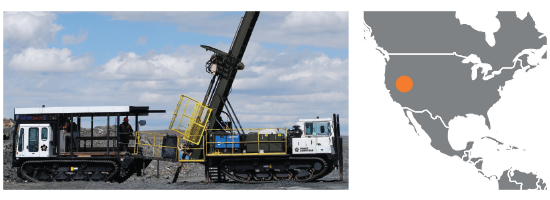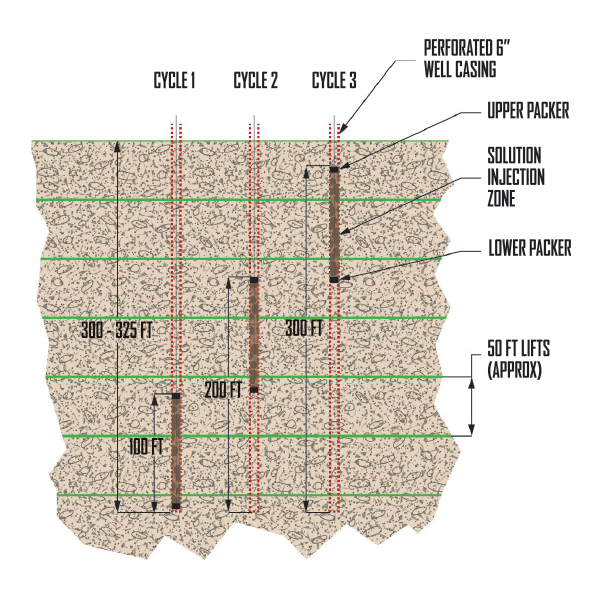OPERATING MINE
April 27, 2017
From Waste Into Wealth: Sonic Sampling and Well Installation
Sonic Sampling and Well Installation of Gold Heap Leach Pad
As the value of minerals continues to rise in the marketplace, mining companies are revisiting their heap leach pads. A heap leach pad can contain a wealth of minerals that are waiting to be discovered. Boart Longyear Drilling Services was contracted to implement their sonic program to sample and install wells into targeted heap leach pads.
Heap leach pads are large piles of rock waste from a mine operation that receive further processing through a leaching solution to remove the mineral ore from the rock. The leaching solution is applied via an irrigation or sprinkler system to the top of the heap leach pad. The solution penetrates the heap leach pad and separates the mineral ore from the rocks. At the bottom of the heap leach pad is an impermeable liner that is angled to allow the solution to be collected in a reservoir and then be sent for further processing.
Using one of their sonic rigs, the LS™600, Boart Longyear can collect highly representative samples and achieve excellent sample recovery. Leach pads are made up mostly of unconsolidated material and the LS600 has proven effective in these conditions by producing 100 percent accurate in-situ core samples. The rig is also used to install wells in the heap leach pad.
The Challenge
Boart Longyear was contracted to sample and install solution wells for the largest gold heap leach pad in the USA, located in Northwest Nevada. The heap leach pad is over 400 feet tall. To achieve that height the mine operation built up the heap leach pad via 50 foot lifts.
When constructing each level, the haulers unavoidably crush and compress the previous top layer of the pad while adding material to the top of the pile. This creates a dense layer that causes a dam effect and does not allow the leaching solution to penetrate through the heap leach pad properly. The heap leach pad can then develop dry pockets where no leaching activity takes place — lowering the efficiency and return on investment.
| Product | LS™600 sonic rig |
| Location | Northwest Nevada |
| Application | Sonic sampling and well installation of heap leach pad (gold) |

Vital Stats
- 6,100 ounces of gold, $8 million ($1,300 per ounce average), extracted from heap leach pad in the first 17 months.
- Project was paid for within the first 70 days.
- 400 percent internal rate of return (IRR) for the client.
The Solution
Boart Longyear was hired to detect dry zones in the leach pad and to reactivate the zones via solution enhancement wells. First the Boart Longyear team drilled test holes to determine the depths of the dry zones and the specific lithological (physical characteristics of the ground) information.
These boreholes were 107 meters (350 ft) deep and were 15 to 23 meters (50 to 75 ft) above the heap leach pad liner. A continuous core sample was obtained by using the LS600 sonic rig. This allowed the Boart Longyear team to determine moisture concentration at accurate depths and to identify exposed ore.

Once depths of ore and moisture levels of the dry zones were indicated, Boart Longyear installed solution enhancement wells using an 11.5-centimeter (4.5 in) flush threaded well casing. The casings allowed the borehole to stay intact as an upper and lower k-packer were installed at specific depths. A 100-foot injection screen was placed between the k-packers to direct the leaching solution into targeted dry zones.
This process was repeated on an eight-week cycle with four weeks of solution and four weeks of rest. Once the cycle was completed, the k-packers and screen were moved to a new depth. The well would receive the solution at three heights, spanning 100 feet each time — bottom, middle, and top.
Over a three-year period, the team, using the LS600 sonic rig, drilled 55 gravity flow solution wells to alleviate the fine unprocessed gold from the heap leach pad. This resulted in 6,100 ounces of gold that equated to $8 million ($1,300 per ounce average). The project paid for itself within the first 70 days and the client received a 400 percent internal rate of return (IRR).
LS600 Sonic Rig
The LS600 sonic rig has the ability to efficiently penetrate the semi-crushed rock, cobbles, and clay found on heap leach pads and in mine dump sites. The LS600 samples are accurate to depth and commonly drilled dry without fluid circulation to minimize risks in sample cross-contamination. This creates a precise and continuous sample with near 100 percent recovery, less than 1 percent hole deviation, up to 80 percent waste reduction and faster penetration than conventional methods.
Sonic frequencies match the resonant energy of the ground, allowing the core barrel to advance in unconsolidated and difficult overburden formations. The LS600 can reach depths up to 182 meters (600 ft) while continuously casing the borehole. This makes the LS600 an optimal choice for multiple markets — exploration mining, environmental, geotechnical, construction, water and mining.
Want to know more? Learn more about Sonic Drilling Services
Media Permission: Boart Longyear grants you immediate agency to republish this article. We request that you cite Boart Longyear as the source and provide a link back where appropriate.



